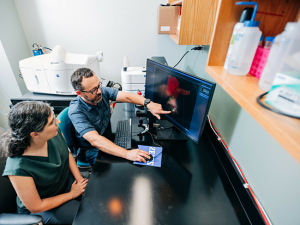 By Katie Bradford and Marla Hertz
By Katie Bradford and Marla Hertz
Beginning Jan. 25, 2023, the National Institutes of Health will implement a new data management and sharing policy, which overhauls the existing 20-year-old policy and reflects both a commitment to open science and to the technological advancements that permit data sharing on a national scale. Under the new policy, NIH investigators will plan prospectively for the managing and sharing of scientific data, submit a DMS plan and comply with the approved plan.
For FY 2022, UAB ranks among the top 5% of U.S. universities based on all federal research and development expenditures and in the top 1% of all public, private and international organizations funded by the National Institutes of Health. Currently, UAB has more than 1,000 active NIH awards, including grants and cooperative agreements or contracts, and nearly 700 principal investigators with have active, pending or processing NIH grants — these awards make up $388 million, or 54%, of UAB’s record research funding of $715 million for FY 2022. Adherence to the new policy is critical to receiving future NIH funding and to increasing the rigor, reproducibility and transparency of research and create open access to data.
How policy changes will affect research at UAB
|
UAB currently has 694 principal investigators with active, pending or processing NIH awards, and 1,077 active NIH awards. |
Under the new policy, each principal investigator at UAB must create a data management plan in order to submit a grant application. Investigators will be expected to maximize sharing of the data generated from NIH-funded research by depositing it in an appropriate data repository. Each plan must address six elements:
- Describe the data and metadata that will be used or generated, and which data will be shared.
- Describe any specialized tools, software or code necessary to access shared data.
- Explain which data standards will be used.
- Name the data repository and state when data will be shared.
- Explain any limitations to data sharing and any protective measures for sensitive data.
- Delegate who in the research group is responsible for overseeing the DMS.
The UAB Office of Sponsored Programs will verify the inclusion and review the plan prior to submission.
Collaborating across campus
|
“Following a DMP will increase the rigor, reproducibility and transparency of research. Not to mention, we also stand to increase the number of citations of UAB research as the shared data will be cited in addition to the traditional publications.” |
To ensure the UAB community is prepared for the transition to new requirements for NIH grants under the data management policy, the UAB Office of Research has assembled a taskforce of individuals from across the university, including Research, the Faculty Senate, the Heersink School of Medicine, UAB Libraries, UAB Information Technology, the Office of Compliance and Risk Assurance and the Office of Sponsored Programs in order to raise awareness, provide education opportunities and assess impacts to campus research support systems.
In November, the Center for Clinical and Translational Science addressed specific details on how to prepare during a virtual webinar, which is available to view online.
While adherence to the new DMP requirements will be necessary to maintain current NIH funding and continue to secure it in the future, Marla Hertz, Ph.D., research data management librarian in UAB Libraries, says that properly securing research data has additional significant benefits. Additionally, the UAB Libraries website contains detailed information and links to resources.
“Following a DMP will increase the rigor, reproducibility and transparency of research,” Hertz explained. “Not to mention, we also stand to increase the number of citations of UAB research as the shared data will be cited in addition to the traditional publications.”

















